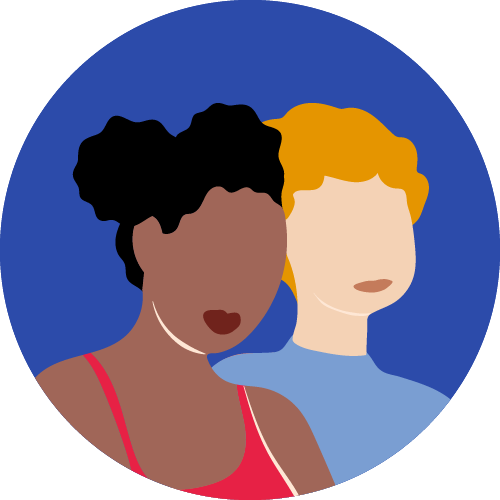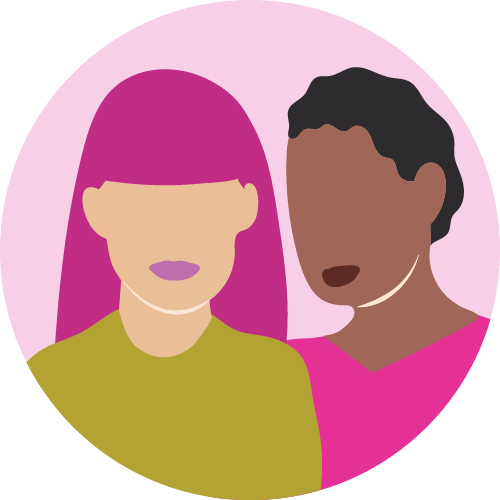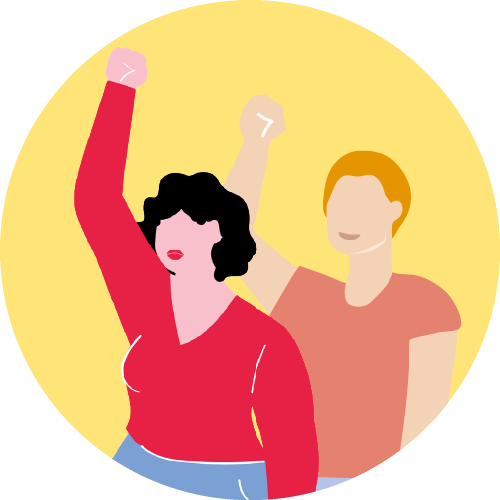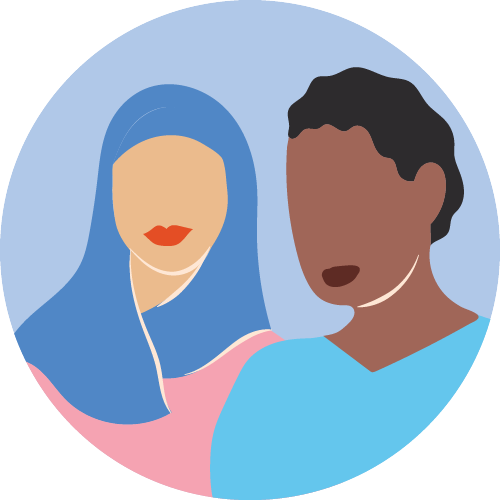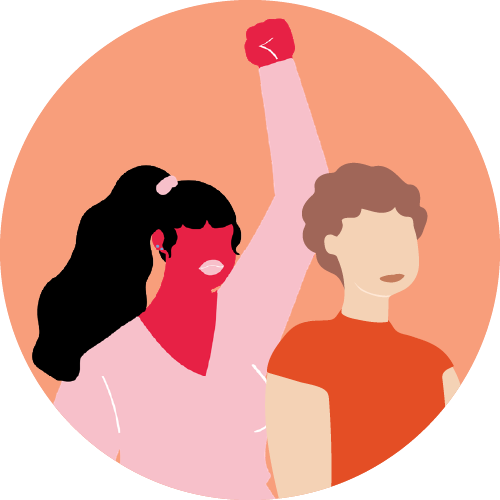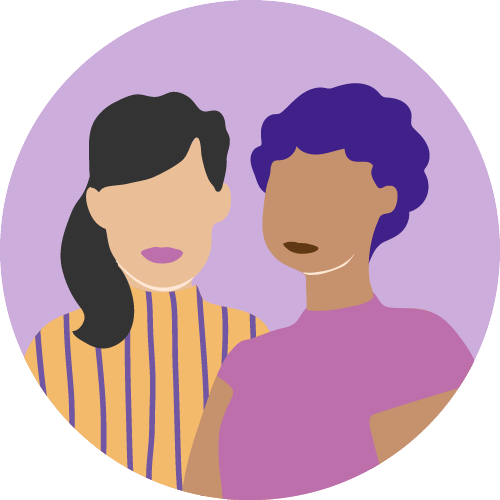This theme explores when and where young people would go to seek support to help a friend. Many, especially the younger age groups, said they would go to a trusted adult such as siblings, an older family member or parents. Some mentioned schoolteachers although there were mixed opinions over this due to concerns around confidentiality. In the focus groups, young people had very mixed feelings about “seeking support” from professionals. The concerns about trust, not feeling a professional would help unless there was physical harm and a general feeling professionals don’t listen to young people was reiterated in some comments in the survey. A key aspect that came out was that young people would not go to a professional without their friend knowing and approving (this is difficult as their friend may not think they're experiencing anything wrong).
Theme 10 - Seeking support

So, what would cause them to seek support? Young people in the focus groups talked about “The time to step in” being if a friend was threatened with physical harm (Some young people acknowledged this would probably be too late and intervention is needed sooner.) The survey confirms the threat of physical harm (79%) or actual physical harm (92%) would definitely be the point at which a young person would seek professional support. We need to find ways to inspire young people to seek support sooner, and clearly show them where to go.
Survey of 641 young people aged 13-24 across England and Wales - August 2021
79% / 92%
The threat of physical (79%) or actual physical harm (92%) would be when young people say they would definitely seek professional support
Does the support or advice understand?
When discussing professional support, young people listed a number of options including domestic abuse helplines, therapists, police, mental health websites and support from college or University. However, young people who were aware of professionals did seem to have personal or work related experience and/or parents who had knowledge of the subject through their own occupations. Within the discussions, there were also suggestions that although the young people were listing possible suggestions, in actuality, they would not use these options themselves.
“I would suggest a friend call a helpline 100% but if I'm honest I wouldn't use one myself ironically - I think there's a stigma around them sadly.” - Young person, 20-24
“Yeah there's something about helplines that can be intimidating.” - Young person, 20-24
Several young people highlighted benefits of talking to a professional, such as, as you would be hearing an independent point of view or you would have a formal record of complaint. However, again there were differing opinions on seeking professional help amongst the young people. A few young people noted worries about services that would become involved if you sought professional help. Others pointed out, if a friend said no to a suggestion of professional help, they would respect their wishes.
“I would suggest going to the police just so there is a formal record of complaint in case anything escalated further down the line.” -
Young person, 20-24
“I'm not of the opinion that like the police can really help in these situations personally.” - Young person, 20-24
Young people discussed searching for help online although the younger age groups didn’t feel they would find suitable content for them.
“I think it would be quite hard to find online, because I think it would be mainly aimed for people who are older and not people who are, like, in secondary school or fourteen and seventeen.” - Young person, 13-16
Some young people felt they wouldn’t be able to find an answer online due to the complexity of the problem. Several young people had also had concerns about whether professional support would be culturally competent and services having cultural understanding.
“Like, I feel you can’t really Google, 'how do I get out of an abusive relationship because I’m a Muslim and nobody in my community can know.'" - Young person, 20-24
“I would suggest a friend call a helpline 100% but if I'm honest I wouldn't use one myself ironically - I think there's a stigma around them sadly.” - Young person, 20-24
“Yeah there's something about helplines that can be intimidating.” - Young person, 20-24
Several young people highlighted benefits of talking to a professional, such as, as you would be hearing an independent point of view or you would have a formal record of complaint. However, again there were differing opinions on seeking professional help amongst the young people. A few young people noted worries about services that would become involved if you sought professional help. Others pointed out, if a friend said no to a suggestion of professional help, they would respect their wishes.
“I would suggest going to the police just so there is a formal record of complaint in case anything escalated further down the line.” -
Young person, 20-24
“I'm not of the opinion that like the police can really help in these situations personally.” - Young person, 20-24
Young people discussed searching for help online although the younger age groups didn’t feel they would find suitable content for them.
“I think it would be quite hard to find online, because I think it would be mainly aimed for people who are older and not people who are, like, in secondary school or fourteen and seventeen.” - Young person, 13-16
Some young people felt they wouldn’t be able to find an answer online due to the complexity of the problem. Several young people had also had concerns about whether professional support would be culturally competent and services having cultural understanding.
“Like, I feel you can’t really Google, 'how do I get out of an abusive relationship because I’m a Muslim and nobody in my community can know.'" - Young person, 20-24
Talking to friends...
As previous research has shown, some young people noted they would prefer to talk to their friends before a professional although discussions emerged where a few young people highlighted the possibility of gossip between networks.
“Friends as peer support can be amazing. But I would probably go to an older friend as they would have more understanding than someone who is quite young although there is the higher risk of gossip.”
- Young person, 13-16
“Friends as peer support can be amazing. But I would probably go to an older friend as they would have more understanding than someone who is quite young although there is the higher risk of gossip.”
- Young person, 13-16
Where do you actually turn to?
Although young people were mentioning trusted adults as contacts for support, some were uncertain where they would access them.
“That's the thing… trusted adults, but I'm not sure where they are.” - Young person, 13-16
“Personally, I don’t think I’d ever go to anyone in school. I don’t trust anything in school because everything we ever say at school always goes back to our parents somehow, even if they say they won’t tell anyone.”
- Young person, 13-16
“That's the thing… trusted adults, but I'm not sure where they are.” - Young person, 13-16
“Personally, I don’t think I’d ever go to anyone in school. I don’t trust anything in school because everything we ever say at school always goes back to our parents somehow, even if they say they won’t tell anyone.”
- Young person, 13-16
Survey of 641 young people aged 13-24 across England and Wales - August 2021
Nearly half of young people said they would ‘very often’ or ‘often’ talk at school (46%), via a Messaging App (45%) or at College/Uni (44%)
Non binary young people are more likely to talk (very often/often) via social media (63%) / 61% Messaging App (61%) than the overall sample
Non binary young people are more likely to talk (very often/often) via social media (63%) / 61% Messaging App (61%) than the overall sample
How would you help a friend
going through this?
going through this?
These are all real stories as told to us by young people
- - Trigger warning - please be aware these stories are hard to read. - -
- - Trigger warning - please be aware these stories are hard to read. - -
My friend has always had a low self esteem and often talked about her ‘knight in shining armour.’ She met this guy and he swept her off her feet. It was very sudden. He moved in with her after 2 weeks. Proposed within 6 months, married within 2 years and a baby not long after that... she was starting to say that she’s unhappy and feels trapped. She’s tried to leave a few times and each time he threatens to kill himself and she goes back.
During lockdown he smashed up the house and she finally left and the police put in a no contact order... 6 weeks later he was back... It feels as if she’s been brainwashed.
The last conversation I had, made me feel like I was crazy. Suddenly he was a god and we were all trying to sabotage their relationship. It was a complete reversal. It was like there was no talking to her. Like she was under some sort of spell. It’s been months since he came back and she’s blocked all her friends and family. Even her parents and she was so close to her mum. We worry all the time and feel we’ve lost her to him and just hope nothing awful happens.
.... I wish I had grown up knowing more about how abusive relationships start. I wish there was more that could be done about coercive relationships.
During lockdown he smashed up the house and she finally left and the police put in a no contact order... 6 weeks later he was back... It feels as if she’s been brainwashed.
The last conversation I had, made me feel like I was crazy. Suddenly he was a god and we were all trying to sabotage their relationship. It was a complete reversal. It was like there was no talking to her. Like she was under some sort of spell. It’s been months since he came back and she’s blocked all her friends and family. Even her parents and she was so close to her mum. We worry all the time and feel we’ve lost her to him and just hope nothing awful happens.
.... I wish I had grown up knowing more about how abusive relationships start. I wish there was more that could be done about coercive relationships.
My friend from school was in a relationship with a boy who she had been with for a couple of years... they were engaged. When we left school she slowly became distant and wouldn't reply to our texts or would find ways to cancel on us. We asked her so many times if she was ok and she said she was.
When he cheated on her, they broke up and she told us that he had been sexually and emotionally abusing her. He used to manipulate her into thinking that if she saw us, it meant she didn't want to be with him. He would do things sexually that she did not want to do. When she told us, we got her help and made sure we were always available to talk if we wanted to.
When he cheated on her, they broke up and she told us that he had been sexually and emotionally abusing her. He used to manipulate her into thinking that if she saw us, it meant she didn't want to be with him. He would do things sexually that she did not want to do. When she told us, we got her help and made sure we were always available to talk if we wanted to.
My best friend has been in an emotionally and financially abusive relationship for a couple of years now. We would have long conversations about him over the phone and over WhatsApp. I told her from day one he was a bad idea, I constantly told her she should leave and was worth better. But she just couldn’t pull herself out of it. I couldn’t understand what she could see in this man.
The hardest part for me was feeling so powerless. She would swear she was leaving him but be back the next week. I’ve found her crying on the stairs because he'd kicked doors off the hinges at home...
She would swear she was leaving all the time but the next week he would be back and then she would go silent. She wouldn't talk on the phone in front of him because she couldn’t be open and herself, and couldn’t answer questions about what had happened.
I could see her being harmed mentally but felt going to the police was overstepping the mark and could turn her against me. It was just a feeling of utter powerlessness. Seeing your friend be knocked down to the absolute depths of despair and not feeling able to help... I wish I had been able to do more or had more information on how to help before it got to this point.
The social worker told her she’s been in an abusive relationship and I think it took a social worker to tell her for it to really hit home. I told her all the time he was abusive, but he would get back in her head and gaslight her into believing it wasn’t abuse. He'd tell her that they were just as bad as each other and needed to work harder on the relationship.
...I almost feel guilty like a bystander. I’ll always wish I had the confidence to stand up and do more. Maybe if there was more support out there for “the friend” and that invisible front line more girls would be able to break their friends out of abusive relationships.
The hardest part for me was feeling so powerless. She would swear she was leaving him but be back the next week. I’ve found her crying on the stairs because he'd kicked doors off the hinges at home...
She would swear she was leaving all the time but the next week he would be back and then she would go silent. She wouldn't talk on the phone in front of him because she couldn’t be open and herself, and couldn’t answer questions about what had happened.
I could see her being harmed mentally but felt going to the police was overstepping the mark and could turn her against me. It was just a feeling of utter powerlessness. Seeing your friend be knocked down to the absolute depths of despair and not feeling able to help... I wish I had been able to do more or had more information on how to help before it got to this point.
The social worker told her she’s been in an abusive relationship and I think it took a social worker to tell her for it to really hit home. I told her all the time he was abusive, but he would get back in her head and gaslight her into believing it wasn’t abuse. He'd tell her that they were just as bad as each other and needed to work harder on the relationship.
...I almost feel guilty like a bystander. I’ll always wish I had the confidence to stand up and do more. Maybe if there was more support out there for “the friend” and that invisible front line more girls would be able to break their friends out of abusive relationships.
When me and my best friend were 13, a male classmate kept calling her several times throughout the day. She didn't respond at first, so he took to texting her repeatedly... I suggested she talk to a teacher, but she felt too uncomfortable to do that. Later on, that boy confronted her... She told him that she wasn't interested in talking to him and threatened to tell her elder brother. He finally stopped troubling her after a few days, but it left a scar on all of us. The boy had even talked to her father on the phone, mimicking a girl's voice, introducing himself as a friend.
My friend's boyfriend's job means that he is on the road all day. Because of this, he rings her all the time, just to chat, as he says it's a boring job. I've told her that this isn't normal as he knows everything she is doing and who she is with and that it's unhealthy that he gets frustrated or annoyed at her when she doesn't answer him...
Myself and her other friends have tried to link her in with support groups or to speak with DA services but she doesn't want 'intervention'. All I can do at this time is be here to offer someone to talk to and try to help her see what support is there but it's tough.
Myself and her other friends have tried to link her in with support groups or to speak with DA services but she doesn't want 'intervention'. All I can do at this time is be here to offer someone to talk to and try to help her see what support is there but it's tough.
He was my first, he constantly pursued me, telling me he loved me and he couldn’t handle my rejection so I gave in and dated him, I fell for him straight away. He had another gf the whole time, broke up with me for her after a few months using me for my body. When I found out he begged for me back, telling me he’s gonna kill himself. He went thru my phone and called/texted me nonstop till I answered or he’d turn up to my house. When I told his family he tried to turn it on me, telling them I was the one cheating on him.
I had a boyfriend who was in my sports club. He wanted to do sexual things all the time. I had panic attacks. I was a year younger. He would say things to me like 'I can't wait until you're sixteen so we can have some fun'. He would touch me inappropriately in public such as grabbing my bum in front of other club members. I tried to move away, he pulled me back. He didn't like it when I asked him to slow down. It got so bad that my friend had to phone him and say it was over because I was too afraid.
64%
Said they would definitely seek professional support if a friend was saying they were scared
Survey of 641 young people aged 13-24 across England and Wales - August 2021
“My friend has always had a low self esteem and often talked about her ‘knight in shining armour.’ She met this guy and he swept her off her feet. It was very sudden. He moved in with her after 2 weeks. Proposed within 6 months, married within 2 years and a baby not long after that... she was starting to say that she’s unhappy and feels trapped. She’s tried to leave a few times and each time he threatens to kill himself and she goes back.
During lockdown he smashed up the house and she finally left and the police put in a no contact order... 6 weeks later he was back... It feels as if she’s been brainwashed.
The last conversation I had made me feel like I was crazy. Suddenly he was a god and we were all trying to sabotage their relationship. It was a complete reversal. It was like there was no talking to her. Like she was under some sort of spell. It’s been months since he came back and she’s blocked all her friends and family. Even her parents and she was so close to her mum. We worry all the time and feel we’ve lost her to him and just hope nothing awful happens.
.... I wish I had grown up knowing more about how abusive relationships start. I wish there was more that could be done about coercive relationships.
During lockdown he smashed up the house and she finally left and the police put in a no contact order... 6 weeks later he was back... It feels as if she’s been brainwashed.
The last conversation I had made me feel like I was crazy. Suddenly he was a god and we were all trying to sabotage their relationship. It was a complete reversal. It was like there was no talking to her. Like she was under some sort of spell. It’s been months since he came back and she’s blocked all her friends and family. Even her parents and she was so close to her mum. We worry all the time and feel we’ve lost her to him and just hope nothing awful happens.
.... I wish I had grown up knowing more about how abusive relationships start. I wish there was more that could be done about coercive relationships.
I was in a toxic relationship with someone in my class.There were red flags straight away, but I didn’t know what to do as I had to see him everyday. I let so many things slide. He was a bully and gaslighted everyone in his life, but people believed all his lies.
One afternoon, I broke down with a teacher I trusted. I told her everything and I felt heard, however it all went down hill straight away. The college allowed him to finish the course AND stay in my class after constant harassment, even the police being called on him...The things he did weren’t exactly crimes, however harassing and stalking is a concern.
One afternoon, I broke down with a teacher I trusted. I told her everything and I felt heard, however it all went down hill straight away. The college allowed him to finish the course AND stay in my class after constant harassment, even the police being called on him...The things he did weren’t exactly crimes, however harassing and stalking is a concern.
I was in a relationship with this boy. I found out his dad is a domestic abuser. This boy that I was dating kept on hurting me. One time, he grabbed my breast and squeezed and shook it and it left me a bruise. A few times he did stuff that I didn't want him to do like touch my butt and stroke my stomach. It made me feel really uncomfortable and I became scared about what he would do to me next. I told Childline and the police came over and dealt with it. Now I am no longer scared of him.
I went out with a boy who would tell me that nobody else would love me. He'd message other boys from my Facebook and Instagram to tell them to back off because I had a boyfriend. He would constantly check my messages and message me to ask where I was. My friends would tell me that it was okay for him to check my messages, it meant he really cared about me. Now that I'm slightly older I now see that it wasn't a healthy relationship. I was scared to leave because I didn't have the confidence to say no.
I ended up calling the police after I broke up with him as he kept threatening me and my friends. The police turned up to his house and told him to leave me alone, a couple days later he was round the corner of my guy friend's house waiting for him and me, yelling at me from across the street.
I've had anxiety, depression and suicidal intentions. At the beginning, he was kind. I told him I was suicidal; he'd tell me I was being too self-centred. I tried to overdose whilst together. I met someone else. I broke up with him over text because it didn't feel safe to see him. He told me that he was my only chance to not be alone, and if I killed myself, it would save him a lot of tears. I'm struggling. I'm back in counselling and got people who support me. Being suicidal doesn't just go away, but I'm trying my hardest, I'll be okay.
Survey of 641 young people aged 13-24 across England and Wales - August 2021
54%
Said they would definitely seek professional support if a friend’s mental health was suffering
Things to think about
- How might we help friends see red flags earlier?
- How might we help friends know where to turn to?
- How might we help friends find confidence in the information they find?
- How might we help friends find the answer they can use to clearcut questions/situations?
How might we...?

Survey of 641 young people aged 13-24 across England and Wales - August 2021
68%
Said they would ‘very often’ or ‘often' talk to friends about toxic or unhealthy relationships face to face (other)
What are we doing about this?
We're currently working with young people in England and Wales to explore these insights so that we can co-produce resources to tackle the problem. We'll then need your help to get them out into places where young people spend time, both offline and online.
As we learn and create, we'll keep updating this page so please do come back to see more.
If you want to get in touch to help with this theme please contact yourbestfriend@safelives.org.uk
#WhatWillWork #YourBestFriend
As we learn and create, we'll keep updating this page so please do come back to see more.
If you want to get in touch to help with this theme please contact yourbestfriend@safelives.org.uk
#WhatWillWork #YourBestFriend
Explore other themes

